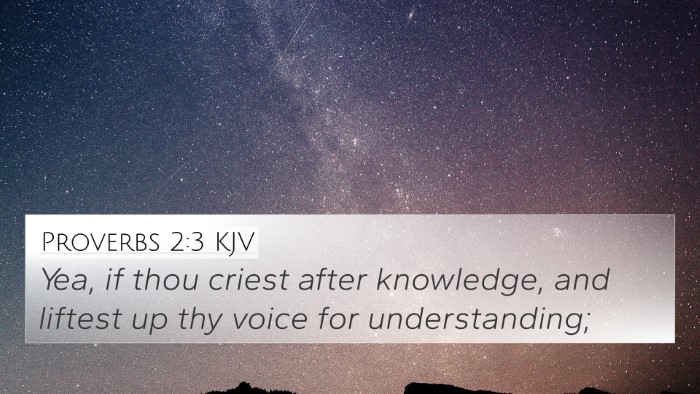Old Testament
Genesis Exodus Leviticus Numbers Deuteronomy Joshua Judges Ruth 1 Samuel 2 Samuel 1 Kings 2 Kings 1 Chronicles 2 Chronicles Ezra Nehemiah Esther Job Psalms Proverbs Ecclesiastes Song of Solomon Isaiah Jeremiah Lamentations Ezekiel Daniel Hosea Joel Amos Obadiah Jonah Micah Nahum Habakkuk Zephaniah Haggai Zechariah MalachiJob 5:27 Similar Verses
Job 5:27 Cross References
Lo this, we have searched it, so it is; hear it, and know thou it for thy good.
Uncover the Rich Themes and Topics of This Bible Verse
Listed below are the Bible themes associated with Job 5:27. We invite you to explore each theme to gain deeper insights into the Scriptures.
Job 5:27 Cross Reference Verses
This section features a detailed cross-reference designed to enrich your understanding of the Scriptures. Below, you will find carefully selected verses that echo the themes and teachings related to Job 5:27 KJV. Click on any image to explore detailed analyses of related Bible verses and uncover deeper theological insights.

Psalms 111:2 (KJV) »
The works of the LORD are great, sought out of all them that have pleasure therein.

Deuteronomy 10:13 (KJV) »
To keep the commandments of the LORD, and his statutes, which I command thee this day for thy good?

Proverbs 2:3 (KJV) »
Yea, if thou criest after knowledge, and liftest up thy voice for understanding;

Job 32:11 (KJV) »
Behold, I waited for your words; I gave ear to your reasons, whilst ye searched out what to say.

Job 8:8 (KJV) »
For enquire, I pray thee, of the former age, and prepare thyself to the search of their fathers:

Job 22:2 (KJV) »
Can a man be profitable unto God, as he that is wise may be profitable unto himself?

Proverbs 9:12 (KJV) »
If thou be wise, thou shalt be wise for thyself: but if thou scornest, thou alone shalt bear it.
Job 5:27 Verse Analysis and Similar Verses
Understanding Job 5:27
Job 5:27 states:
"Lo this, we have searched it, so it is; hear it, and know thou it for thy good."
This verse is a culmination of Eliphaz's discourse, emphasizing the importance of the insights gathered through experience and observation. Eliphaz, in this passage, seeks to validate the content of his previous proclamations regarding God's justice and the futility of human complaints against divine providence.
Commentary Insights
Combining insights from renowned public domain commentaries:
-
Matthew Henry:
Henry highlights the tone of certitude in Eliphaz's statement. He underscores the idea that Eliphaz presents his conclusions based on divine revelation and personal experience, suggesting that the wisdom he shares isn’t merely opinion but grounded in evidential truth.
-
Albert Barnes:
Barnes points out the reassurance present in the verse. He explains that Eliphaz offers a way of facing one’s sufferings and trials by understanding that those who seek wisdom will find it, reinforcing the notion that God’s ways may perplex us but are ultimately for our good.
-
Adam Clarke:
Clarke emphasizes the importance of self-examination in the pursuit of spiritual understanding. He notes that the statement serves as both a lesson and an invitation, urging listeners to heed wise counsel learned through struggle and human experience.
Cross-References and Thematic Connections
Job 5:27 connects with various other biblical texts, providing depth and enhancing the understanding of its message. Below are some significant cross-references:
- Proverbs 4:7: "Wisdom is the principal thing; therefore get wisdom: and with all thy getting get understanding."
- Romans 8:28: "And we know that all things work together for good to them that love God, to them who are the called according to his purpose."
- Isaiah 55:8-9: "For my thoughts are not your thoughts, neither are your ways my ways, saith the LORD."
- James 1:5: "If any of you lack wisdom, let him ask of God, that giveth to all men liberally, and upbraideth not; and it shall be given him."
- Ecclesiastes 7:14: "In the day of prosperity be joyful, but in the day of adversity consider: God also hath set the one over against the other, to the end that man should find nothing after him."
- Psalms 119:71: "It is good for me that I have been afflicted; that I might learn thy statutes."
- Proverbs 3:5-6: "Trust in the LORD with all thine heart; and lean not unto thine own understanding. In all thy ways acknowledge him, and he shall direct thy paths."
Exploring Connections Between Verses
This verse invites a deeper engagement with the themes of wisdom, suffering, and divine purpose. The connections between these scriptures highlight the cohesiveness of biblical teaching regarding God’s sovereignty and our understanding through trials. The overarching themes include:
- Wisdom in Suffering: Many verses emphasize that afflictions refine character and understanding.
- The Goodness of God: The belief that God intends good for those who love Him serves as a recurring theme throughout scripture.
- Human Limitations: Acknowledging that God’s understanding surpasses human reasoning is a persistent biblical motif.
Methodology in Cross-Referencing
To effectively utilize cross-references in Bible study, consider the following tools and methods:
- Bible Concordance: A comprehensive resource that lists biblical words and their contexts.
- Bible Cross-Reference Guide: A systematic approach to finding related verses.
- Cross-Referencing Bible Study: Engaging in studies that examine how various verses relate to one another, enhancing theological understanding.
- Comprehensive Bible Cross-Reference Materials: Utilizing commentaries, guides, and biblical resources to see parallels between scripture.
Conclusion
Job 5:27 serves as a profound reminder of the importance of applying wisdom gleaned from both scripture and life experiences. It encourages believers to seek understanding in their trials while assuring them that all things are part of God’s greater good.
In summary, through the exploration of this verse, we see the rich interconnections between various scriptures which can deepen one’s faith and understanding of the divine narrative presented throughout the Bible.





